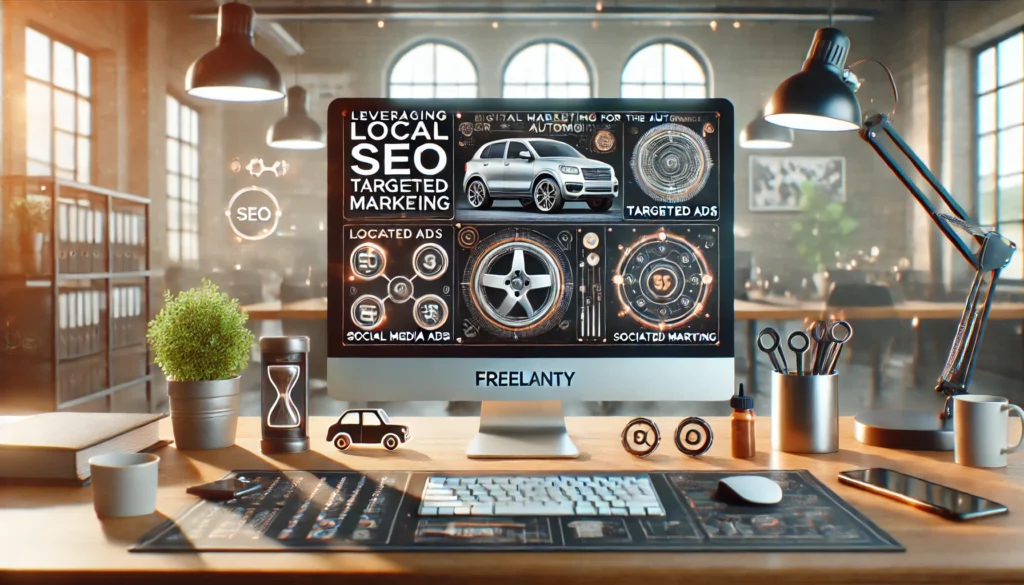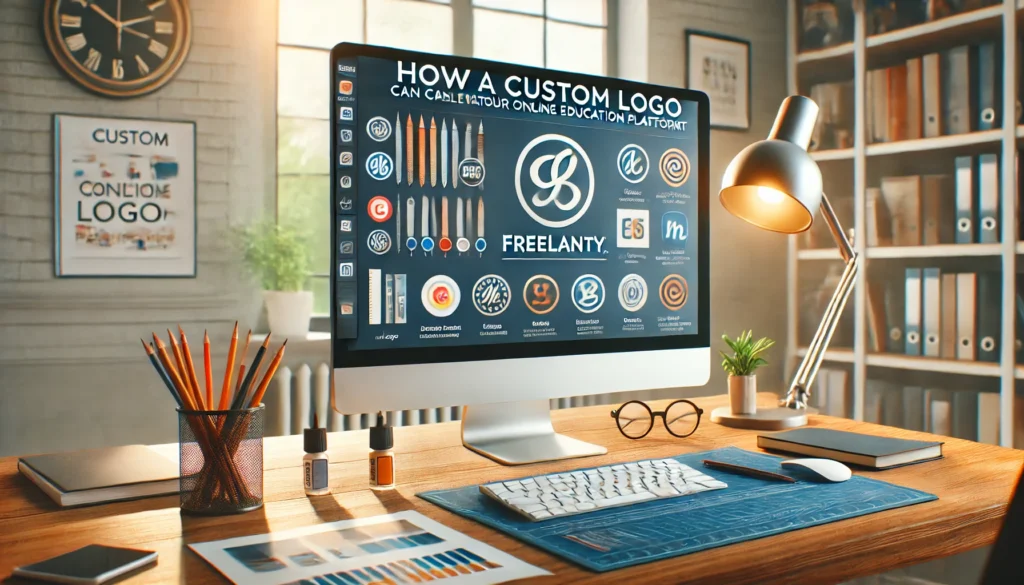







In today’s competitive automotive industry, digital marketing has become an essential tool for car dealerships and auto repair shops to attract and retain customers. As more consumers turn to online platforms to research vehicles, compare services, and make purchasing decisions, automotive businesses must leverage strategies like local SEO, targeted advertising, and social media marketing to stand out. This article explores how these digital marketing strategies can help automotive businesses increase visibility, drive traffic, and grow their customer base.
For car dealerships and auto repair shops, visibility is key to attracting new customers. With more consumers researching their options online before visiting a dealership or repair shop, it’s crucial to ensure that your business appears prominently in search results. Digital marketing strategies such as local SEO and targeted ads can help boost your visibility, ensuring that potential customers find your business when they search for automotive services in your area.
The automotive industry is highly local, with customers typically seeking services within their geographic area. Digital marketing allows you to target these local customers more effectively. By optimizing your online presence for local search terms and using location-based advertising, you can reach customers who are actively searching for automotive services near them. This localized approach not only drives foot traffic but also increases the likelihood of converting leads into loyal customers.
Trust is a crucial factor in the automotive industry, where customers often make significant investments in their vehicles. Digital marketing helps build and maintain trust by allowing you to showcase customer reviews, share authentic content, and engage with your audience on social media. By consistently providing valuable information and positive experiences, your automotive business can establish itself as a trusted provider in the community.
Google My Business (GMB) is a powerful tool for improving your local SEO and increasing visibility in local search results. For car dealerships and auto repair shops, it’s essential to claim and optimize your GMB profile with accurate business information, including your address, phone number, hours of operation, and services offered. Regularly update your GMB profile with photos, posts, and special offers to keep your listing active and engaging. Encourage satisfied customers to leave positive reviews on your GMB profile, as these reviews play a significant role in influencing potential customers.
Incorporating local keywords into your website content is crucial for attracting customers in your area. Conduct keyword research to identify the terms that potential customers use when searching for automotive services near them. For example, keywords like “car dealership in [city],” “auto repair shop near me,” or “oil change in [location]” can help drive local traffic to your website. Include these local keywords in your website’s meta titles, descriptions, headers, and content to improve your search engine rankings for local queries.
Online reviews are a vital component of your local SEO strategy and play a significant role in building trust with potential customers. Encourage your satisfied customers to leave reviews on platforms like Google, Yelp, and Facebook. Respond to reviews, both positive and negative, to show that you value customer feedback and are committed to providing excellent service. Positive reviews can significantly impact your local search rankings and influence potential customers’ decisions when choosing an automotive service provider.
Building local backlinks is another effective way to boost your local SEO and increase your website’s authority. Reach out to local businesses, organizations, and directories to establish partnerships and earn backlinks to your website. For example, you could sponsor a local event or collaborate with a nearby business to cross-promote each other’s services. Additionally, getting listed in local directories and industry-specific websites can help improve your online visibility and drive more local traffic to your site.
Google Ads is a powerful tool for automotive businesses looking to attract more customers. With Google Ads, your business can appear at the top of search results when potential customers search for automotive services like yours. Use relevant keywords, such as “buy a car in [city]” or “auto repair near me,” to target your ads. Google Ads also offers advanced targeting options, allowing you to reach specific audiences based on location, device, and search intent. This ensures that your ads are seen by the most relevant customers, increasing the likelihood of conversions.
Social media advertising allows you to reach a targeted audience on platforms like Facebook, Instagram, and LinkedIn. These platforms offer robust advertising options that enable you to target specific demographics, such as age, location, interests, and automotive preferences. Use social media ads to promote special offers, showcase new vehicles, or highlight customer testimonials. Include clear calls to action (CTAs) in your ads to encourage potential customers to visit your dealership or schedule a service appointment.
Retargeting, also known as remarketing, is a strategy that allows you to re-engage with users who have previously visited your website but didn’t take action. By displaying targeted ads to these users as they browse other websites or social media platforms, you can remind them of your offerings and encourage them to return to your site. Retargeting is particularly effective in the automotive industry, where the decision to purchase a vehicle or schedule a repair often involves extensive research and consideration.
The effectiveness of your targeted advertising campaigns depends heavily on the quality of your ad copy and design. For automotive businesses, it’s essential to create compelling ads that grab attention and clearly communicate your value proposition. Use high-quality images of vehicles or services, and write persuasive copy that highlights the benefits of choosing your dealership or repair shop. Incorporate CTAs that prompt users to take the next step, such as “Book a Test Drive,” “Schedule an Appointment,” or “Learn More.” A well-crafted ad can significantly increase click-through rates and drive more traffic to your website.
Choosing the right social media platforms is crucial for reaching your target audience in the automotive industry. For car dealerships, Facebook and Instagram are particularly effective due to their visual nature and large user base. Facebook allows you to build community through groups and events, while Instagram enables you to showcase vehicles and services through photos and videos. LinkedIn can be valuable for B2B marketing and connecting with corporate clients, while YouTube is ideal for sharing video content such as car reviews, tutorials, and customer testimonials.
To keep your audience engaged on social media, share a variety of content that highlights your offerings and provides value to your followers. Post high-quality images and videos of vehicles, behind-the-scenes looks at your repair shop, maintenance tips, and customer success stories. Use Instagram Stories or Facebook Live to host virtual car tours, Q&A sessions with automotive experts, or live demos of your services. Interactive content, such as polls, quizzes, and contests, can also boost engagement and foster a sense of community among your followers.
Engaging with your customers on social media is essential for building relationships and fostering loyalty. Respond promptly to comments, messages, and reviews, addressing any questions or concerns. Encourage customers to share their experiences with your dealership or repair shop by posting photos or leaving reviews on your social media pages. Featuring user-generated content, such as customer photos or testimonials, can also build trust and showcase your commitment to customer satisfaction.
Running social media contests is a great way to increase engagement and attract new followers. For automotive businesses, contests can be centered around themes like “Best Car Photo,” “Favorite Road Trip Memory,” or “Car Care Tips.” Encourage participants to enter by sharing a photo or story related to the contest theme, using a branded hashtag, and tagging your business. Offer attractive prizes, such as a free oil change, car detailing, or a gift card, to incentivize participation. Contests can generate buzz around your brand, increase your social media following, and drive more traffic to your website.
Blogging is a powerful tool for automotive businesses to share valuable information, improve SEO, and attract potential customers. Blog posts can cover topics like car maintenance tips, industry news, vehicle reviews, and customer success stories. Regularly updating a blog with informative and engaging content helps attract visitors to your website, showcases your expertise, and improves your visibility in search engines. Additionally, blogging allows you to address common customer questions and concerns, positioning your business as a trusted resource in the automotive industry.
Video content is highly engaging and can help automotive businesses connect with customers on a deeper level. Create videos that showcase your vehicles, demonstrate repair services, or provide maintenance tips. For car dealerships, consider creating virtual car tours, test drive experiences, or customer testimonials. For auto repair shops, videos can feature repair processes, DIY car care tips, or behind-the-scenes looks at your workshop. Videos can be shared on your website, YouTube, and social media, reaching a broader audience and making your brand more accessible.
Customer testimonials are a powerful form of content marketing that can build trust and credibility with potential customers. Highlight specific customers who have had positive experiences with your dealership or repair shop, detailing their journey, challenges, and outcomes. Testimonials provide social proof that your automotive services are reliable and effective, helping to attract new customers who are motivated by similar needs. Feature these testimonials on your website, in your marketing materials, and across your social media channels.
Creating educational guides is another effective content marketing strategy for automotive businesses. These guides can provide in-depth information on topics such as car maintenance, buying a new vehicle, or understanding repair services. For example, a dealership might create a guide titled “How to Choose the Right Car for Your Lifestyle,” while an auto repair shop could offer a guide on “Essential Car Maintenance Tips for New Drivers.” Offering these guides as free downloads in exchange for contact information is a great way to generate leads and build relationships with potential customers.
Your website is the foundation of your online presence. It should be professionally designed, easy to navigate, and optimized for search engines. Include detailed information about your services, vehicles, and team, as well as high-quality images and videos. Ensure that your contact information is easily accessible and that customers can quickly find the information they need. Additionally, consider integrating an online booking system to allow customers to schedule service appointments or test drives directly through your website.
With more people searching for automotive services on mobile devices, optimizing your website for mobile is essential. A mobile-friendly website should load quickly, be easy to navigate, and display content clearly on smaller screens. Ensure that your booking engine or inventory search is mobile-friendly, making it easy for customers to book appointments or browse vehicles directly from their smartphones. Mobile optimization not only improves user experience but also boosts your chances of ranking higher in mobile search results.
Online reviews and testimonials are critical components of your automotive business’s online reputation. Positive reviews can significantly influence potential customers’ decisions when choosing a car dealership or auto repair shop. Encourage satisfied customers to leave reviews on platforms like Google, Yelp, and Facebook. Display these testimonials prominently on your website to build trust with potential customers. Additionally, respond to reviews, both positive and negative, to show that you value customer feedback and are committed to providing excellent service.
To measure the success of your digital marketing efforts, track key metrics such as website traffic, conversion rates, bounce rates, and lead generation. For SEO, monitor your search rankings, organic traffic, and keyword performance. For PPC campaigns, track metrics like CTR, CPC, and ROI. On social media, track engagement metrics like likes, shares, comments, and follower growth.
Several tools can help you monitor and analyze your digital marketing performance. Google Analytics is essential for tracking website traffic and user behavior. SEO tools like Ahrefs and SEMrush provide insights into keyword rankings and backlink profiles. Social media platforms offer built-in analytics tools to monitor your posts’ performance, while PPC platforms like Google Ads and Facebook Ads Manager provide detailed insights into your ad campaigns.
Use the data you collect to make informed decisions about your digital marketing strategy. Analyze the performance of your campaigns to identify what’s working and what’s not. For example, if a particular landing page has a high bounce rate, consider revisiting the page’s design, content, or loading speed. Regularly reviewing your analytics will help you optimize your marketing efforts for better results.
With more people searching for automotive services on mobile devices, ignoring mobile optimization can lead to a poor user experience, lower search rankings, and lost opportunities. Ensure that your website is fully responsive, loads quickly, and provides a seamless experience on mobile devices.
SEO is critical for driving organic traffic and improving your business’s visibility online. Failing to invest in SEO can result in lower search rankings and reduced online visibility. Focus on both on-page and local SEO, and regularly update your content to keep it relevant and optimized for search engines.
Consistency in branding is crucial for building a strong online presence. Ensure that your visual and messaging style is consistent across all digital platforms, from your website to social media profiles and online ads. Inconsistent branding can confuse potential customers and weaken your business’s impact. Develop brand guidelines to maintain consistency in all your marketing efforts.
AI and automation are transforming digital marketing in the automotive industry. AI can help businesses analyze customer data, predict trends, and personalize marketing messages. Automation tools can streamline tasks such as email marketing, social media posting, and lead nurturing, allowing automotive businesses to focus more on delivering exceptional customer experiences.
Personalization will continue to be a major trend in digital marketing. Customers expect personalized experiences tailored to their needs and preferences. Leveraging customer data and AI-driven tools can help automotive businesses deliver highly personalized marketing campaigns, from tailored vehicle recommendations to customized service offers.
Virtual and augmented reality (VR and AR) are becoming increasingly popular in the automotive industry, offering customers immersive experiences that bring them closer to the products and services. Car dealerships can use VR and AR to create virtual car tours, allowing potential buyers to explore vehicles from the comfort of their homes. Auto repair shops can use these technologies to provide interactive demonstrations of repair processes, making the experience more tangible and engaging. Integrating VR and AR into your marketing strategy can set your business apart and attract tech-savvy customers.
Why is digital marketing important for the automotive industry?
Digital marketing is crucial for the automotive industry because it helps car dealerships and auto repair shops increase visibility, attract local customers, and build trust. Effective digital marketing strategies, including local SEO, targeted advertising, and social media marketing, are essential for reaching and engaging potential customers.
How can automotive businesses use SEO to attract more customers?
Automotive businesses can use SEO by conducting keyword research, optimizing their website for relevant search terms, and improving on-page and local SEO. Additionally, focusing on mobile optimization can help attract customers who search for automotive services on their smartphones.
What are the benefits of content marketing for car dealerships and auto repair shops?
Content marketing benefits automotive businesses by providing valuable information to potential customers, improving SEO, and building trust. Creating content such as blog posts, videos, and customer testimonials helps establish your business as an authority in the automotive industry.
How can social media marketing help automotive businesses build brand awareness?
Social media marketing allows automotive businesses to reach a broader audience, engage with customers, and showcase their offerings. Through organic content, paid advertising, and influencer partnerships, social media can significantly boost brand awareness and drive customer acquisition.
What are future trends in digital marketing for the automotive industry?
Future trends include the use of AI and automation for personalized marketing, the integration of VR and AR for immersive customer experiences, and delivering highly personalized customer journeys based on data-driven insights.
Digital marketing offers car dealerships and auto repair shops powerful tools to attract and retain customers, build trust, and grow their businesses. By leveraging local SEO, targeted advertising, social media marketing, and content creation strategies, automotive businesses can enhance their online presence, reach the right audience, and stay competitive in the industry. As the digital landscape continues to evolve, staying ahead of trends and continuously optimizing your digital marketing strategies will be key to long-term success in the automotive industry.



Ready to take your project to the next level? At Freelanty, we connect you with talented freelancers who bring your vision to life. Contact us today and discover how we can help you succeed.